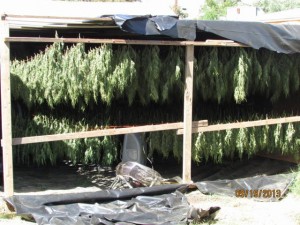
The Tulare County Board of Supervisors voted 5 – 0 on June 3rd to ban all medical marijuana cultivation by cooperatives or individuals. Previously it was legal for cooperatives to grow 99 plants, and for individuals to grow up to 24 plants within an enclosed structure and out of public view.
The board was presented with two options to revise their existing ordinance. Option one banned all cultivation, possession or distribution of medical marijuana, whether by an individual or a collective or cooperative. The second option would have banned all marijuana collectives or cooperatives, but allow individual cultivation. The board voted for option one.
The ban needs to jump through several hoops before it becomes an official ordinance. A formal amendment to the current ordinance needs to be drafted by county staff and then reviewed by the Tulare County Planning Commission. A public hearing will be held when the planning commission goes through their review process. The commission may approve, modify or reject the drafted ordinance presented by the staff. The final outcome could be very different from the vote taken on June 3rd, but the board of supervisors has expressed a clear direction they want the county to take, which is a complete ban of the cultivation of medical marijuana.
Douglass Hurt, attorney for Compassionate Cannabis Information Center (CCIC) out of Goshen, was dismayed that the board of supervisors voted in the opposite direction of the rest of the country on this issue. He explained that banning the cultivation of medical marijuana will push the production underground making it even more dangerous to the community. It will also subject people fighting cancer and many other debilitating illnesses to buying pot from hardened drug dealers who are also selling meth and heroin. A member of CCIC said that medical marijuana is not a gateway drug; it’s the type of people associated with illegally growing and selling pot that makes it a gateway drug.
The board has been keen to ban the cultivation of pot since the California Supreme Court upheld Live Oaks’ ordinance that completely bans the growing and distributing of medical marijuana. The Supreme Court ruling gave counties and cities the right to ban medical marijuana even though California legalized it in 1996.
After the board of supervisors voted, Sandra Lambert of Ivanhoe asked who was now in charge if she lived or died. Mike Spata, associate director of the Tulare County Resource Management Agency, said that she would have another chance to address the issue with the Tulare County Planning Commission at the end of June. Her situation is life or death because the morphine that she used to take for her fibromyalgia and crushed vertebrae was destroying her liver. Her doctors said that her liver wouldn’t last more than a year on morphine and recommended medical marijuana. She grows marijuana in an enclosed green house at her property, which would be illegal under the ban.
The Tulare County Board of Supervisors regulates the cultivation of pot only in unincorporated areas. Their ruling today would not affect growers in incorporated cities such as Visalia or Exeter. The board’s main motivation to ban medical marijuana is because of its link with violent crimes and the fact that some growers used the veil of medical marijuana to operate lucrative and illegal pot gardens and dispensaries.
Tulare County is following the lead of the Fresno County Board of Supervisors that banned all marijuana cultivation in their unincorporated areas starting in February. The ban includes fines of $1,000 per plant.
According to the Fresno Bee, “Sheriff Margaret Mims said the cultivation ban can’t come soon enough. In 2013, there were 20 violent incidents involving marijuana cultivation. Mims estimates the cost of enforcement at $307,000 annually. County officials had no estimates on how much money the fines and any liens would reap under the ordinance.”
Fresno County was the first to ban medical marijuana cultivation in California. The ban goes against what 56% of the voters of California intended when they approved proposition 215 in 1996. Called the California Compassionate Use Act, the law makes it legal for patients and their caregivers to grow marijuana for their personal medical use, but also gave counties and cities the right to regulate where it’s grown. Patients diagnosed with an illness where the use of marijuana was recommended by a doctor now had legal access to the drug. The most common conditions alleviated with marijuana are arthritis, anorexia, cancer, chronic pain, HIV or AIDS, epilepsy, migraine and multiple sclerosis. California was the first state to legalize medical marijuana, and in May, 2014 Minnesota became the 22nd.
There are important legal differences between medical marijuana at the federal and state levels. At the federal level, pot is illegal due to the implementation of the Controlled Substances Act. This act states that marijuana has no current accepted medical use and that it has a high potential for abuse. But even the federal government is changing its attitude to match the 81% of Americans who believe medical marijuana should be legal. In 2009, new federal guidelines were enacted that deprioritized going after crimes involving pot.”It will not be a priority to use federal resources to prosecute patients with serious illnesses or their caregivers who are complying with state laws on medical marijuana,” said Attorney General Eric Holder.
Just last week, Congress voted to block the Justice Department from interfering with state laws permitting the use, distribution, possession or cultivation of medical marijuana. The measure now heads to the Senate where it is expected to pass. Forty-nine Republicans voted for this provision, including some of the most conservative. All local Republican Congressmen voted against it except Tom McClintock of Mariposa.
